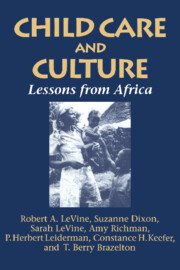Book contents
- Frontmatter
- Contents
- List of tables and figures
- Foreword
- Acknowledgments
- Introduction
- Part I African infancy: Frameworks for understanding
- Part II Parenthood among the Gusii of Kenya
- Part III Infant care and development in a Gusii community
- Part IV Interpretations
- Appendix A Fieldwork procedures: Initial phases and planning
- Appendix B Coding categories for spot observations
- Appendix C Blankhart Nutrition Questionnaire
- Appendix D Temperament Assessment Method
- Appendix E Coding categories for narrative observations
- Appendix F Coding categories for face-to-face interaction
- Appendix G Coding categories for maternal teaching task
- Appendix H Supplementary tables
- Notes
- References
- Index
- Plate section
Introduction
Published online by Cambridge University Press: 11 May 2010
- Frontmatter
- Contents
- List of tables and figures
- Foreword
- Acknowledgments
- Introduction
- Part I African infancy: Frameworks for understanding
- Part II Parenthood among the Gusii of Kenya
- Part III Infant care and development in a Gusii community
- Part IV Interpretations
- Appendix A Fieldwork procedures: Initial phases and planning
- Appendix B Coding categories for spot observations
- Appendix C Blankhart Nutrition Questionnaire
- Appendix D Temperament Assessment Method
- Appendix E Coding categories for narrative observations
- Appendix F Coding categories for face-to-face interaction
- Appendix G Coding categories for maternal teaching task
- Appendix H Supplementary tables
- Notes
- References
- Index
- Plate section
Summary
This book examines parenthood, infancy, and early childhood in an African community, revealing patterns and practices unanticipated by theories of child development and proposing a cultural approach to the understanding of early environments. In comparing the Gusii people of Kenya with the American white middle class, we show their differing patterns of reproductive behavior and child care to be goal-driven, not by goals fixed in the course of human evolution but by historically conditioned cultural models that set a parental agenda for optimizing certain potentials of human development over others. Gusii parents give priority to their own fertility, the survival of their infants, and the compliance of their children – goals they have been largely successful in attaining during the 20th century. (The Gusii have one of the highest fertility rates in the world.) In describing Gusii family life and infant care practices, we demonstrate how their organization as parental strategies was coherent and efficacious in the indigenous context while becoming increasingly problematic under new conditions.
This study of 28 Gusii children and their environments over 17 months provides a profile of care from birth to 30 months of age, includes comparisons of Gusii and American mother–infant interaction, and indicates many specific differences in caregiving environments. Gusii mothers breast-feed for 16 months, sleep with their infants, leave them during the daytime with child caregivers as young as 5 years old, and avoid praising or questioning toddlers or engaging them in extended conversations.
- Type
- Chapter
- Information
- Child Care and CultureLessons from Africa, pp. 1 - 4Publisher: Cambridge University PressPrint publication year: 1994

